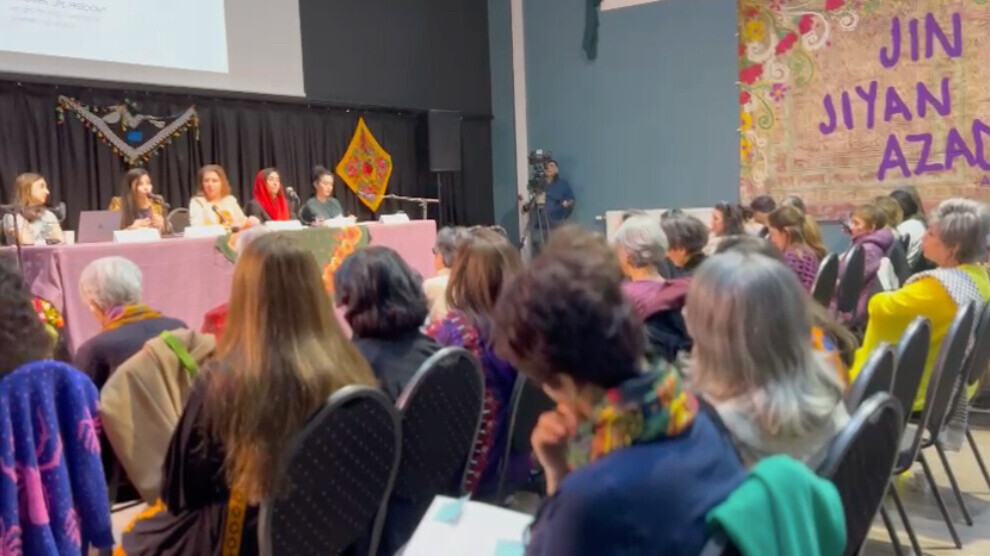‘Jin, Jiyan, Azadî’ Conference in Stockholm
KJAR is holding a conference in Stockholm on women's resistance in Iran and Rojhilat (East Kurdistan).
KJAR is holding a conference in Stockholm on women's resistance in Iran and Rojhilat (East Kurdistan).

The Community of Free Women of Eastern Kurdistan (KJAR) is organising a two-day conference titled "Jin Jiyan Azadî" (Woman, Life, Freedom).
The conference on women's resistance in Iran and Rojhilat is attended by hundreds of women, including members of RJAK (Kurdistan Free Women's Movement), Iranian Communist Women's Movement, Iranian Feminist Collective, Jinên Komala, Amara Women's Assembly, women academics and artists.
The conference is discussing the "Jin Jiyan Azadî" activities and the current stage of women's struggle.
The conference started on Saturday with a minute of silence, followed by an opening speech made by Meyrem Fethî, President of KJAR European Coordination. Meyrem Fethî noted that it has been a year and a half since Jina Mahsa Amini was murdered by the Iranian state and that the reactions and protests led by women against the killing of the young Kurdish woman spread all over the world and had a great impact.
Stating that the persecution and oppression of women that has been going on for thousands of years was crushed by the struggle of women, Meryem Fethî said, "Last year, the whole world saw how women shook the system formed by the dominant male mentality which subjected women to persecution. After the killing of Kurdish woman Jîna Amini by Iran, the 'Jin Jiyan Azadî' uprising and resistance began. This resistance is still going on. Many panels and conferences have been organised about this resistance so far. The aim of this conference is for women to reveal their own path, stance and original politics on the basis of this resistance. The aim is for women to determine this with their own will. The topic of discussion is how women in Baluchistan have achieved success, what are the alternatives voiced by women, what should be done to protect the results and gains after the resistance of Kurdish and Iranian women. It will also be discussed what kind of attitude KJAR puts forward for freedom and peace in Kurdistan, Iran and the Middle East. Participants and speakers will express their thoughts on this subject. Together we will look for answers to these questions and our own stance. Once again, I commemorate with respect all the martyrs and the women who were massacred by the invaders."
Then Swedish artist Stina Bonges made a speech, which she started by greeting the struggle of Kurdish women. She recalled the massacres targeting Kurdish women twice in Paris and noted that Sakine Cansız, one of the leading cadres of the Freedom Movement, who was martyred in the 1st Paris massacre, was the symbol of women's struggle. Stating that she was very impressed when she heard about the murder of Sakine Cansız in Paris, Bonges said that she composed a song about Sakine Cansız, talking about the effect she had on her. Stina Bongens then sang the song she composed for Sakine Cansız, which caused moments of emotion.
In the first part of the conference, a panel titled "Struggle for Women's Rights in the history of Iran and Rojhilat Kurdistan" took place. The panel was moderated by Shîwa Qelbazî and Dr Shahin Nawaî from Peter Lang Publishing House in Germany gave a talk on women's resistance under the Shah's rule during the Safavid time. Dr Shahin Nawaî explained how women were portrayed in ancient texts and gave information about the establishment of the first women's communities in Iran, Baluchistan and Rojhilat Kurdistan and the history of feminist activities. Shahin Nawaî talked about women's struggles against feudal systems and the mentality of violence created by state systems in the last 200 years. She underlined that women's struggle continues to develop despite all the pressures.
The main topics of today's session include "The Effect of Internal and External Dynamics on the Revolution", "Problems of the Continuity of the Revolts", "Women's Revolution and Society".
The first session of the second day included presentations by former Afghanistan MP Belqis Roşen, academic Rojin Mokriyani from University College Cork-Ireland, academic Sara Kirmaniyan from the UK and academic Nêda Hoşeng from Sweden.
Hundreds of Kurdish, Baloch, Afghan and Persian women are attending the conference on its second day.
Baloch activist Fariba Barhanzehi made an important speech in the Saturday sessions of the conference. Barhanzehi highlighted the importance of the 'Woman, Life, Freedom' uprising and stated that this rebellion initiated an intellectual renaissance and social transformation throughout Iran.
Important parts of Barhanzehi's speech are as follows:
"The 'Woman, Life, Freedom' rebellion brought social segments together and formed a social alliance under the leadership of women. This alliance brought together Balochi, Kurdish, Turkish, Arab, Lor, Hazar and Turkmen communities who have been trying to preserve their existence in Iran throughout its history.
"After the killing of Jina Amini by the Iranian regime, the Baloch people rose up loudly against the bloodthirsty regime. The uprising, which started in Kurdish cities, was so effective in Zahidan that it opened the borders. The Balochis of Pakistan saluted the revolt of the Iranian peoples and organised demonstrations for days. Dozens of innocent civilians were massacred by the regime guards in Baluchistan cities. However, the Baloch people stood against the regime's oppression and murder of women, raised their voices and continued their protests. Today, both Iran and Pakistan are attacking Baluchistan cities with heavy weapons. Women and children are being massacred. Balochis emphasise the need to strengthen the alliance of resistance and break the rule of racist regimes, as was the case during the 'Jin Jiyan Azadi' uprising."